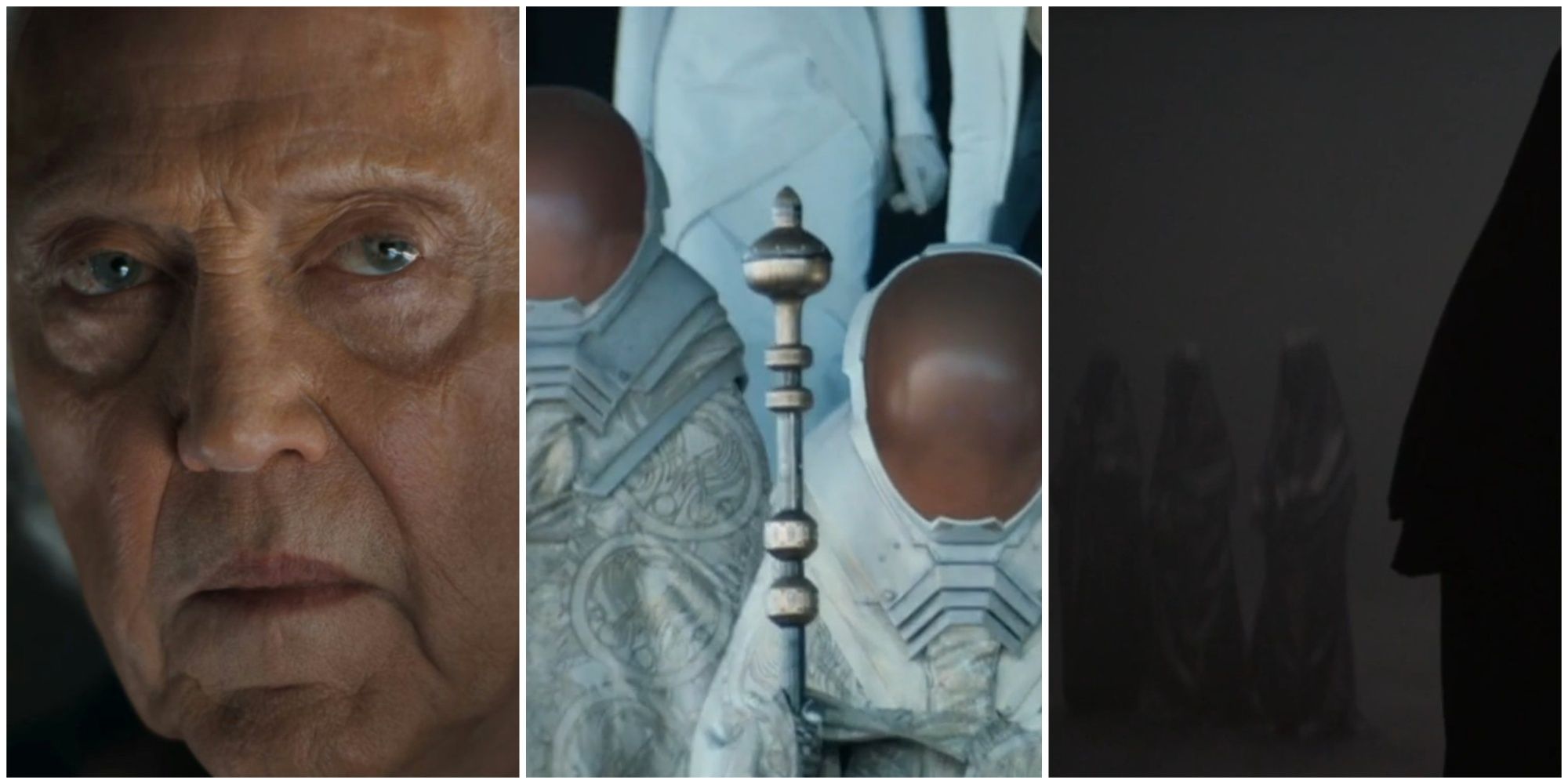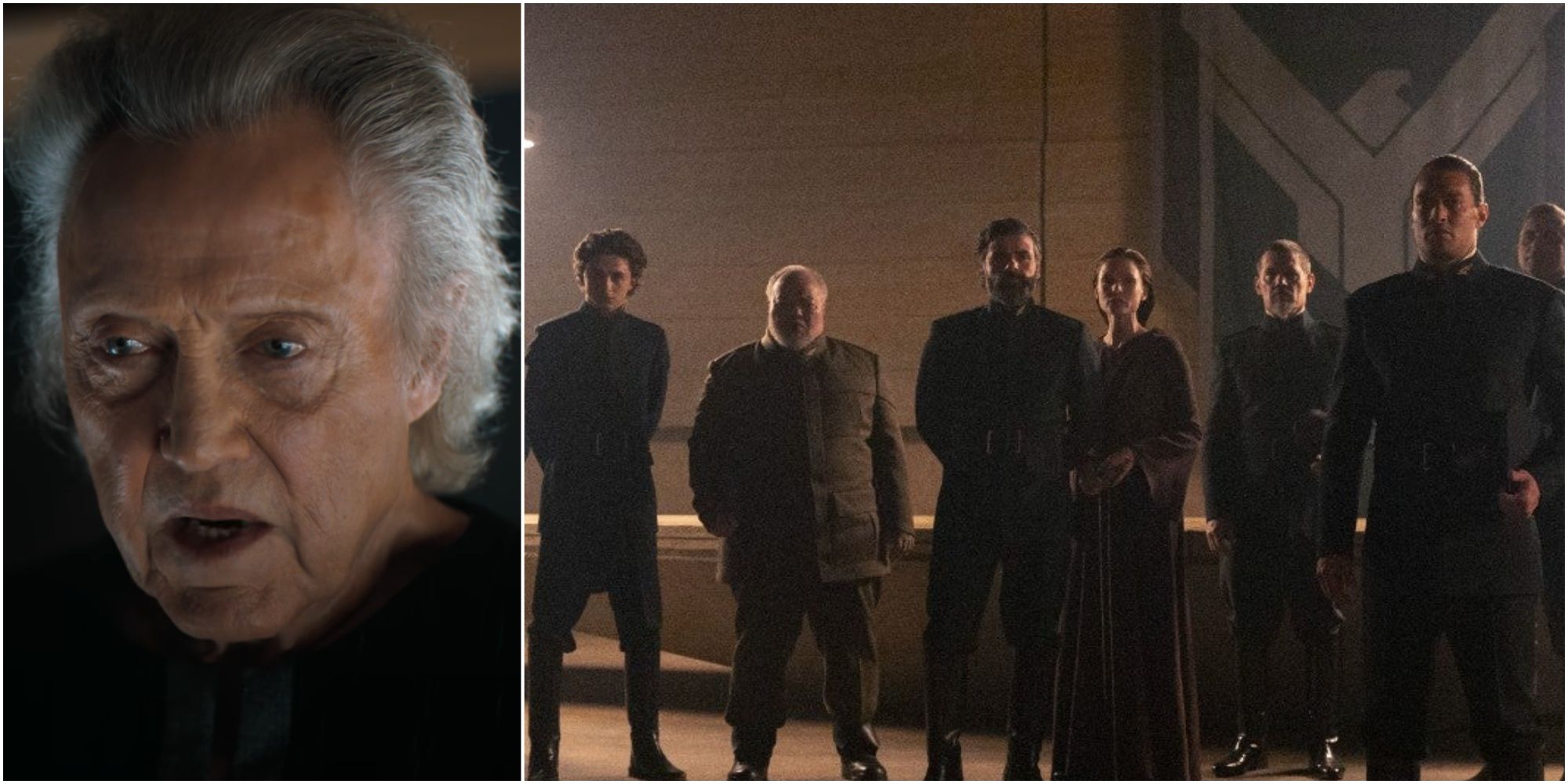Quick Links
The feudal system of Dune is unstable, complicated, and repressive. The hereditary Padishah Emperor of House Corrino rules over the Known Universe. He is the source of power and control at the Corrino Imperium, with Planet Kaitain functioning as his Empire's seat and administrative center. While the Imperium is the supreme body in the Known Universe, headed by the supreme leader, it is formed of institutions or forces, each with different functions and powers.
The Imperial Household's brand of authoritarianism is balanced against the federated Great Houses. According to Dune, the CHOAM company possesses a monopoly over interplanetary trade and the Spacing Guild over interstellar travel. All the Great Houses are given representation via the Landsraad, which threatens the Imperial Household's stability. The Houses could very well unite against the Imperial Household, and potentially upend things. Against this backdrop, the Emperor imposes the Faufreluche system to enforce a rigid social hierarchy for his benefit.

Dune: The Politics Of The Imperium, Explained
The Imperium in Frank Herbert's Dune is a delicate balance between the Imperial House and the various powers that constitute it.
The Feudal Society Of Dune
Class hierarchy is the bedrock of a feudal system. Frank Herbert's Dune tells the tale of an interstellar society, 20,000 years into the future, where humanity has regressed into feudalism. The feudal hierarchy places Emperor Shaddam Corrino IV at the top, followed by the Great Houses / Houses Major / Great Families of the Landsraad, which are given planetary fiefdoms. They have jurisdiction over their respective Homeworlds, and/or fiefs, and carry out economic activities which in turn allow them to fill their coffers. They rule their planets and train their armies in any way they see fit.
From one of these Great Houses, comes the ruling House that controls the Imperium, and the realm. At the beginning of Dune, House Corrino has had the Imperium in a chokehold for more than 10,000 standard years. The Corrinos achieve domination through their deadly Sardaukar, trained on the Imperial Army Planet: Salusa Secundus, also known as the Emperor's Prison Planet.
The Padishah Emperor is equivalent to a modern-day head of the government and the chief executive. He is the single most important authority in Dune. The Imperial decrees that he issues carry considerable weight within the Known Universe, so much so that Duke Leto Atreides I is unable to refuse the offer of ruling Arrakis, even though he knows it's a trap. He prepares to leave his ancestral seat of Caladan, which has been the home of the Atreides for 26 generations.
What Is The Faufreluche System?
Royalty and Nobility In Dune
The Houses are the crucial aspect of the rigid Faufreluche class distinction enforced by the Imperium. The House system has a hierarchy of its own, and some Houses, such as the Harkonnens, are the richest because they ravaged Arrakis for 80 years, mining the Spice. The Atreides aren't one of the richer Houses, but they are honorable. Because of Leto's swift rise as a powerful figure at the Landsraad, the Emperor lures him to Arrakis. The Harkonnens join forces with the Emperor's Sardaukar to massacre the Great House Atreides on the Desert Planet.
As laid out in Dune lore, the most prominent Great Houses in the collective, besides Corrino, Harkonnen, and Atreides, are Fenring, Ginaz, Halleck, and Metulli. Their heads hold different titles: Duke Leto of Atreides; Baron Vladimir of Harkonnen; and Count Hasimir of Fenring, to name a few examples. The Houses Major convene to make crucial decisions through the gathering known as the High Council, which is presided over by the Padishah Emperor. They each have a stake in CHAOM by way of the Landsraad.
Houses Minor, on the other hand, are noble families which boast aristocratic descent. Although Houses Minor aren't given planets in fiefs, they are blue-blooded and possess vast wealth. Interestingly, some Houses Minor are more renowned than the Great Houses. This, of course, depends on the trade they engage in.
The Core Principle Behind The Faufreluche Class System
The Faufreluche system is meant to be an effective safeguard against the alienation of individuals and minorities from the realm of the Known Universe. The motto that encapsulates its core values and beliefs is:
A place for every man and every man in his place.
In addition to the Padishah Emperor, the Great Houses, and the Minor House, Siridar Fiefs are an important component in the said stratification.
What Is a Siridar Fief?
A Siridar is a Great House's planetary fief given by the Emperor. The Great Houses exert the will of the Emperor, or in other words, uphold the rule of law (the Imperial law) and enforce conformity to the social order of the Faufreluche system. A Planetary Governor, such as Duke Leto Atreides of Caladan, functions as a Siridar, and tithes tax and profits collected from his subjects to the Emperor. The Emperor is at discretion to withdraw a Siridar Fief, banish Great Houses for breaking the Imperial Law, or replace a Great House on a specific planet with another. It is pertinent to mention that the Landsraad is also empowered to carry out banishment by a ruling.
In Denis Villeneuve's Dune, Duke Leto Atreides wants to rule on the newly assigned Siridar Fief of Dune/Arrakis with honor and justice. During his negotiations with the Fremen Naib of Sietch Tabr, Stilgar, he promises to respect the law of the land, saying:
The Emperor has given me Arrakis as my fief to rule and protect. I cannot promise not to travel into the desert if duty compels me. But your Sietches will be yours forever. And you will never be hunted while I govern here.
The doctrine of the Faufreluche system is that the Emperor has to have absolute power over his people in order to guide (control) them. He is the central figure, while the governors are his local representatives in the vast political web of Dune.

Dune
Based on the novel by Frank Herbert, Dune follows the story of Paul Atreides played by Timothée Chalamet, whose family take control of a planet that holds the key to faster than light travel, and certain mental powers. This futuristic fantasy world is rife with politics, religion, wars and betrayals, as empires and factions fight for control over the planet.

Dune: Concubines, Explained
Rebecca Ferguson's Lady Jessica was Duke Leto Atreides' concubine in Dune: Part One. But why didn't the Duke marry her?





